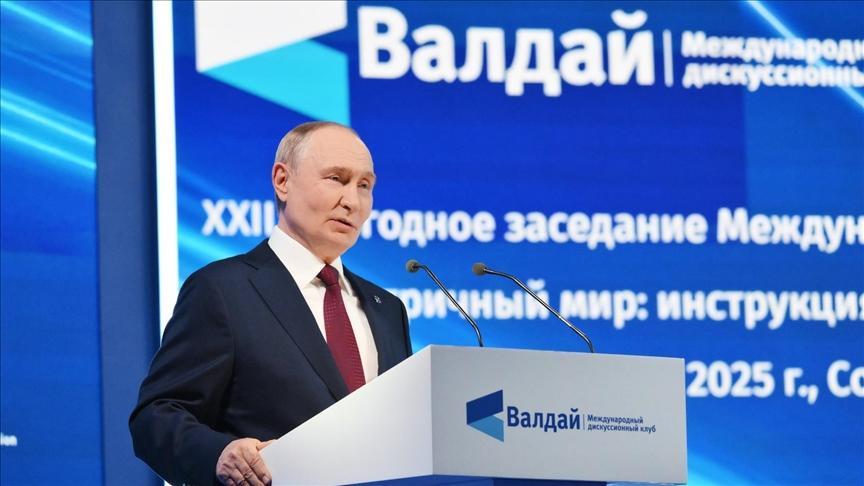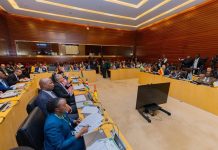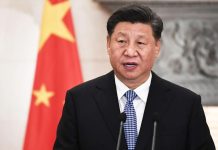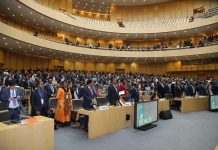Africa-Press – Lesotho. Russian President Vladimir Putin declared Thursday that the world is entering a “polycentric era” where no single power can dictate rules, warning Europe against militarization, expressing conditional support for US President Donald Trump’s Gaza proposals and placing responsibility for the continuation of the Ukraine war on Western states.
“Discussions at the Valdai forum provide an opportunity to objectively and comprehensively assess the situation around the world,” he said, adding that multipolarity is “a qualitatively new phenomenon” that creates both opportunities and risks.
“No one is ready to play by rules set by one person somewhere far away,” he argued.
– Multipolar world and global governance
Putin argued that a multipolar world is more democratic, since it allows “a large number of political and economic players” to influence outcomes.
“Perhaps never before on the global stage have there been so many countries influencing or seeking to influence the most important regional and global processes,” he said.
Putin insisted that solutions in this environment must rest on broad consensus.
“Any solutions are possible only on the basis of agreements that satisfy all interested parties or the overwhelming majority. Otherwise, there will be no viable solution at all,” he said.
He added that Western-led institutions had “lost their meaning” by straying from their original mandates and turning into “platforms for political lectures.”
The Russian leader praised organizations such as BRICS and the Shanghai Cooperation Organization, saying they reflect genuine consensus and balance among members.
“They aren’t against anyone, they’re for themselves,” he said, contrasting this with what he described as the “hegemonic” tendencies of the West.
Europe, NATO and security
Putin devoted significant attention to Europe, portraying it as a continent whose elites manufacture threats from Russia to cover up domestic crises.
He said European leaders are “inflating the image of an enemy” while their own citizens face rising debts, migration challenges and “a growing crisis of social security systems.”
“Most people in Europe cannot comprehend why they are so afraid of Russia that, to confront it, they must tighten their belts ever tighter and forget about their own interests,” he said.
He dismissed claims of Russian plans to attack NATO as “nonsense” and “impossible to believe.”
Warning of military buildups, Putin said: “We’re closely monitoring the growing militarization of Europe. Russia’s response will not be long in coming. The response to these threats, to put it mildly, will be very convincing.”
He stressed that Russia had “never initiated a military confrontation,” but history shows that “weakness is unacceptable, because it creates the illusion that any issue with us can be resolved by force.”
Ukraine conflict
Turning to the war in Ukraine, Putin called it “a Ukrainian tragedy…painful for Ukrainians and Russians, for all of us.”
He repeated Moscow’s argument that Western countries had long used Ukraine as a tool “to expand their zone of control” and said Kyiv had been turned into “expendable material.”
He said the conflict could have been avoided if earlier US administrations had taken a different approach and if NATO had not advanced toward Russia’s borders.
“If Ukraine had ultimately preserved its independence, its true sovereignty, this could have been avoided,” he said.
Putin said that Russia’s forces hold the strategic initiative on the battlefield, citing advances in several areas.
He also presented detailed casualty and desertion figures for Ukraine, alleging that Kyiv’s mobilization is faltering.
Independent verification is difficult for these battlefield claims due to the ongoing conflict.
He urged Kyiv to negotiate.
“It would be better for the Kyiv leadership to think about how to reach an agreement. We have discussed this many times and proposed doing so.”
He insisted that Russia has enough manpower and that its losses are “many times less” than those of Ukraine.
Putin also welcomed mediation efforts by countries such as China, India, Saudi Arabia and Türkiye but accused Europe of deliberately escalating the conflict.
“Unfortunately, it hasn’t been possible to stop the fighting yet, but the responsibility for this lies not with the majority, but with the minority, primarily Europe,” he said.
Relations with the US
On ties with Washington, Putin adopted a pragmatic tone, saying the current US administration communicates directly.
“It is always better to clearly understand what the other person wants than to try to guess through vague hints,” he said.
He added that Russia reserves the right to pursue its own national interests, one of which is restoring “full-fledged relations with the United States.”
“No matter what the differences, if we treat each other with respect, then bargaining—even the most tough and persistent—will ultimately lead to consensus,” he said.
Gaza and the Middle East
Putin also addressed the conflict in Gaza, describing it as “a horrific event in modern history.” He said even UN Secretary-General Antonio Guterres had called Gaza “the largest children’s cemetery in the world,” calling the humanitarian toll “tragic.”
On Trump’s initiatives, Putin said they “may bring some light at the end of the tunnel.”
He said handing control of Gaza to Palestinian Authority President Mahmoud Abbas would be the “preferable option” and called Trump’s idea of freeing all hostages in Gaza alongside releasing Palestinians from Israeli prisons “worthy of support.”
He stressed that any plan must be accepted by Palestinians themselves, including Hamas, and by the wider Islamic world.
“It is absolutely essential to understand how Palestine itself feels about this,” he said, adding that Israel’s stance is also decisive.
Putin acknowledged skepticism over former UK Prime Minister Tony Blair being proposed to lead an interim administration in Gaza but said Blair “could play a positive role” if channeled toward peace.
“If all the positive things I mentioned happen, then it will certainly be a breakthrough. And the breakthrough could be quite positive,” he said.
He reiterated that a Palestinian state is the cornerstone of any long-term settlement.
“The creation of a Palestinian state is a key element of the overall settlement,” he said.
For More News And Analysis About Lesotho Follow Africa-Press






